Peking University, January 8, 2021: Tao Shu, professor of PKU College of Urban and Environmental Sciences (CUES) and also member of Chinese Academy of Science, received the 2020 Teaching Achievement Award on August 24 as a recognition of his distinguished contribution in education for more than 30 years.
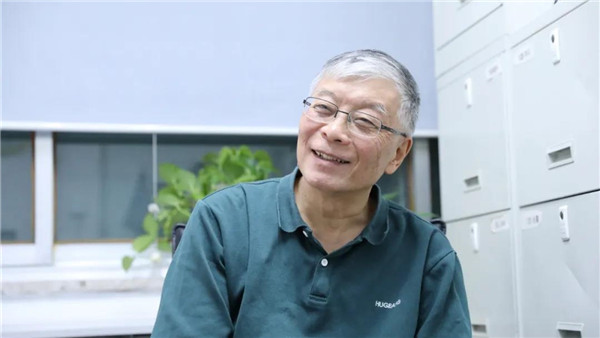
Tao Shu
Interestingly, winning this award seemed to have made no profound impact on the way Tao carries out his daily routine. For him, finding better ways to deliver knowledge in class, or digging into academic issues with his students brings more satisfaction than receiving a prize. When asking about his acceptance speech, he mocked himself as “a geek who’s not adept at eloquence”, reinforcing the stereotype of a geeky scientist. However, as his students commented, Tao was energetic in his classes, fulling the whole 90 minute lecture with exemplars and interesting research stories, lighting the zest of students, which ultimately has led hundreds of students into the wondrous realm of environmental science.
A preserver of thirst for knowledge had underwent long night
At first sight, it would seem unimaginable that Tao would be in his seventies. He seemed boisterous, spoke fast and was quick-witted, living his life with so much momentum and energy that his student, Ren Yu’ang, once commented that when engaging in conversations with Tao, “you have to stay concentrated, or you will soon fall behind his pace”. It seemed that Tao was able to keep himself energetic all the time. He filled his days with working 7 days a week, arriving at his office early in the morning, filling himself with exploring unchartered scientific fields, refining class materials, and holding enlightening discussions with his students. The strength that powered him up every day to follow such a tight schedule for decades was boiled down to his life-long passion namely environmental sciences.
Tao ascribed his academic passion to his unique life experience. He depicted himself as a maverick who was “lax in all disciplines, except for the principles of nature.” However, as astounding as his achievements, Tao also faced numerous setbacks on his quest for knowledge. Tao’s early school years was abruptly disrupted by the catastrophic Cultural Revolution, which lasted 10 years from 1966 to 1976. During this time, he went to the rural areas to be “re-educated by poor and lower-middle peasants.” After graduating from junior high school, he became one of the millions of educated urban youth who went to and worked in the countryside in the late 1960s. In an era with endless, frenzied political turmoil, attending classes and gaining knowledge became an extravagance far beyond one’s reach. Tao did not back down however, and after five years of strenuous work, he finally got a chance to continue his studies at Peking University as a worker-peasant-soldier student (the college students selected from workers, peasants and soldiers but not Gaokao between 1970 and 1977). He cherished this hard-earned opportunity and learned diligently to satiate his long-suppressed desire for knowledge. He worked in the Chinese Academy of Science for one year after his graduation from PKU in 1977 and went abroad for further exploration in environmental sciences at the University of Kansas. This experience fully lightened his enthusiasm toward research and helped him solidify his dream of becoming a scholar. “Science will never let you down because it will always bring you exciting discoveries in unexpected ways.”
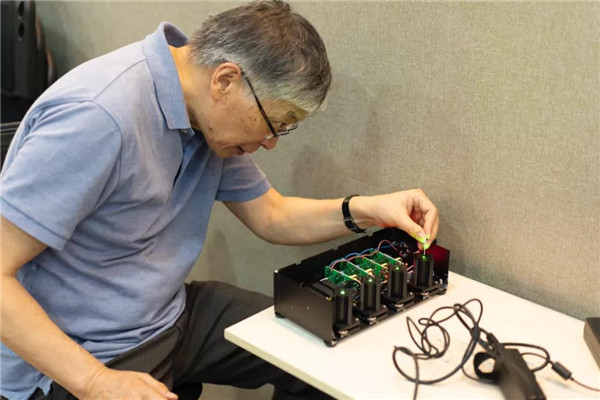
Tao optimizes an air pollution monitoring device
A teacher puts examples before words in class
In 1984, Tao returned to PKU, and immediately felt his transformation from a student to a teacher to be strange and unsettling. “You have to overcome anxiety from all aspects, whether it be speaking in public, or attempting to make yourself understood by others, or finding the best way to gather students’ interest during your class.” He spent 2 to 3 years developing his own humorous teaching style, which made him popular among CUES students.
Professor Tao summarized his teaching philosophy as “put examples before words”. He now teaches two mandatory courses each year. One being the Applied Statistics for the postgraduate level and the other called the Research Methods of Environmental Science for the undergraduate level. Both courses emphasized the practicability of statistic models being applied in real environmental cases, which meant that abundant background materials and timely update of examples were needed in facilitating the classes. By tackling this matter, Tao included his discussion with teachers from different academic backgrounds and integrated his research experience into the course material. He carried out his class by running through a series of topics, which respectively included scientific problems he encountered during his research and the methods he applied to solve them by utilizing the appropriate statistical models. Key points in the class were often emphasized to provide clues for impending case study projects. Meanwhile, the prompt update of background materials and problems covered in the course ensured that the course would always keep up with research frontiers. Final exam were held without a time limit; and since exams were open-book, students were allowed to bring in reference materials. By doing so, Tao hoped that students would bring out their best during exams and choose models most-fitted to his questions.
Tao’s way of teaching gained himself and his courses the level of popularity that extended far beyond his department. His class was always crowded with students from different faculties. Most of them spoke highly of Tao and his lessons. Tao recalled a gratifying scene many years ago, when a student of his came up to him and thanked him for what he’d done, “He (the student) excitedly told me the methods of analyzing problems which he learned from my course helped him a lot in his research and field work, even though his research field had nothing to do with environmental studies. I hope that my students can finish my course and become knowledgeable problem-solvers capable of facing any problem that arises, irrespective of their major.”
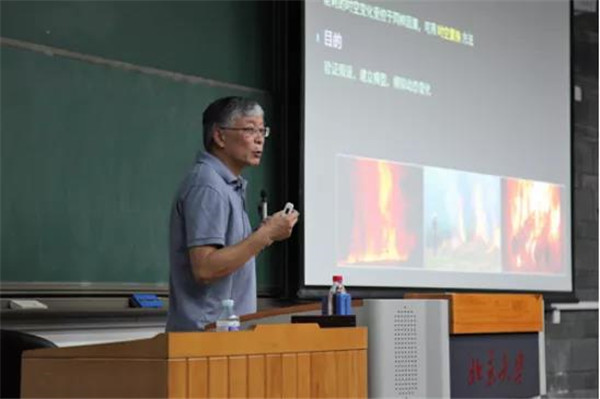
A “boss” cherishes academic liberty and the zeals of youth
Guiding students in the way to pursue their academic goals was another important aspect of Tao’s mission. He was a strong advocate of academic liberty and wished that his students could voyage freely in the ocean of environmental science. Unlike most research groups in the world, Tao seldom organized routine meetings, which normally involved students sharing their progress or papers in public meetings. “Frequent meeting might act as an extra burden on students’ shoulders, both mentally and physically. I prefer small-scale discussions that are more targeted and efficient, so that students can save more time and energy delving into their exploration. But what matters most is that this form of exchange can allow for a more enlightening atmosphere where students can express their ideas boldly.”
Different from their counterparts majoring in humanities, professors in scientific fields were generally referred to as “boss” by their students, which might have come across as a skewed misconception of what a teacher-student relationship would be like. Tao, however, did not mind his students calling him “boss”. While Tao considered it as “an informal but proper title”, in his opinion, a research group leader should seek funds and exchange opportunities for his students (“like what a real boss typically would do”, he noted with a laugh), as well as providing full training on various research methods, data analysis, and crucial advice on the strenuous process of applying for funds. “It is our job to collect funds, students just have to become better researchers,” said Tao.
Throughout the past 30 years, his team achieved rich yields in the field of research, including more than 300 publications that were cited over 20,000 times. Their work on the emission and environmental behavior of trace toxic pollutants provided viable solutions to many impending ecological challenges China would face in the pursuit for modernization; and the corresponding results were well-recognized by world-renowned journals such as Nature Geoscience, Nature Communications and Science Advances etc. Many of his graduates have become prominent scholars in the field of environmental science. Tao’s team would continue to cultivate talented youth who wished to pursue further academic studies in famous universities or institutes at home and abroad.
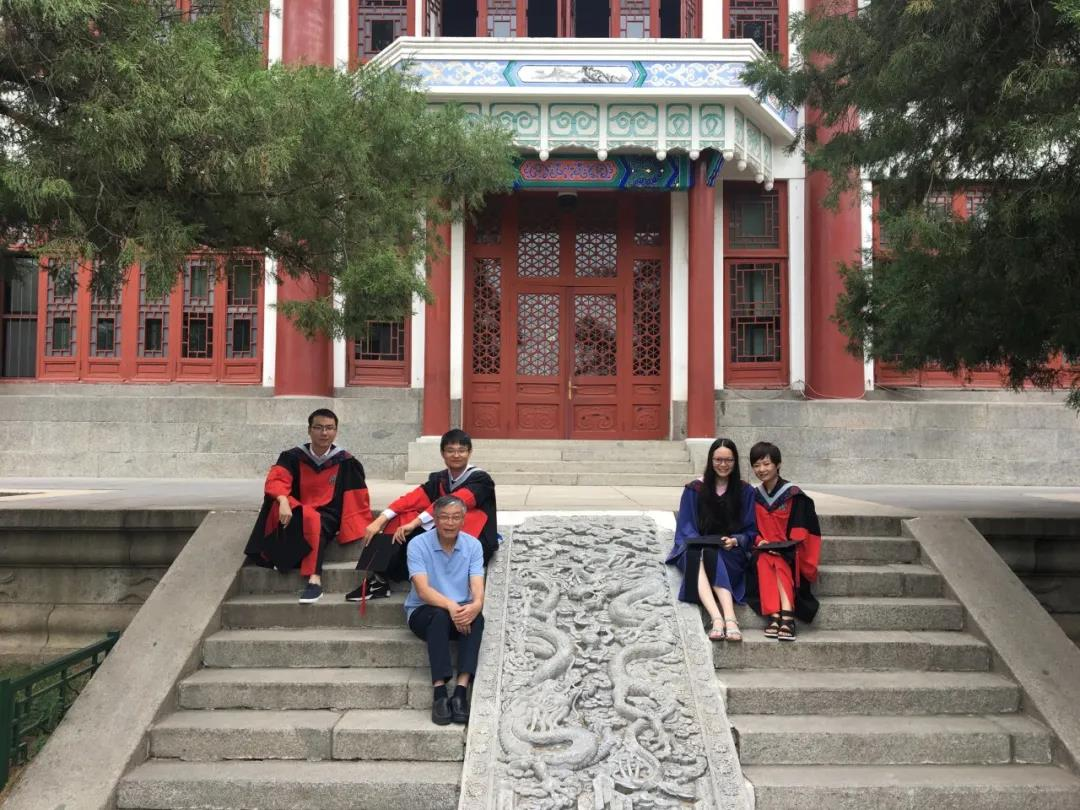
The inclusion of PKU environmental science into the “Basic Disciplines Top-notch Student Training Plan” was another achievement of Tao’s. Initiated by China’s Ministry of Education, the project aimed to foster promising young scientists in several science fields. Undergraduates involved in the project would be provided with guidance from their tutors, more access to labs and researches, more academic exchanges with their counterparts around the world, and personalized teaching plans closely adhered to their interests. In most universities, the Plan only covers areas such as mathematics, physics, chemistry, life science and computer science. But Tao managed to include the PKU environmental science into the range of programs. In his mind, “a teacher should provide opportunities to students to expand their horizons.” He set it up as his priority to protect youth’s zeal towards science. “There are huge amounts of boring and repetitive tasks to complete before you finish a project. But Professor Tao always tells us to show interesting parts of our experiment to undergraduates visiting our lab, so we can attract their interest towards our studies.” Said Zhang Wenxiao, a PhD candidate in Tao’s group, who also benefited from the Plan. “When I first came to CUES five years ago, I felt confused and didn’t know what to do as my career. Then, in the second year I joined the Plan and entered Tao’s lab, where I have remained to this day. Thanks to the Plan, I found the area that I’m interested in, and learned a lot under the guidance of senior students in our group. ” Like Zhang, many top-notch undergraduates in CUES has made great academic progress based on the financial support of the Plan and the guidance from Tao, many of their works were even published in top journals including PNAS, IE and ES&T.
A magic “Peter Pan” brings student a future full of hope
In Tao’s office, there lies a console packed with bottles of sand in different colors. “That was my personal collection.” Tao laughed proudly. “My students and friends brought them (to me) from every corner of the world. Now they make up a mini-museum.”
Tao’s youthfulness often made him a “Peter-pan” figure among his research team. “Boss Tao has a ‘kid-like’ side to him, he wants to find playmates,” as one of his students joked. In his leisure time, Tao enjoyed playing military chess with his younger students. “The general military chess would usually be surrounded by four countries, but ours involved six ones. The chessboard was designed by boss (Tao) himself,” commented Xu Haoran, who just started his third year in Tao’s group. He was designated as the “military adviser” in the opposite side “against” Tao. “He urged us not to lose the game on purpose, but truthfully even if we tried our best it would still be unlikely to beat him in a chess game.”
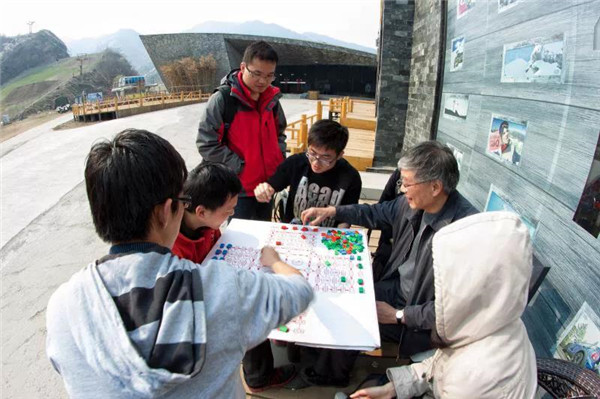
Tao plays chess with his students
Tao maintained his habit of exercising since youth. In the early period of the COVID-19 pandemic when nobody was allowed to walk out, he did sit-ups every morning, recorded the number each day and drew linear charts which he learned to do after years of conducting research. “What was so amazing was that he recorded each time he took to do the sit-ups each day, and created a graph showcasing the progress he’s made.” Ren Yu-ang added. “We all agree that our boss is the healthiest man in our group. One of us challenged our boss in the game of wrist wrestling, and well, it wouldn’t be a strange thing to see a strong lad defeated by a senior close to 70 years old in our laboratory!” The annual spring outing was a favorite thing of Tao’s as well. He would bike his old bicycle rather than taking transit to arrive at places, and climb the mountains so fast that sometimes the youngsters couldn’t even keep up with him.
“Boss Tao has convinced us that being a professor will preserve our youthful side for the rest of our lives. By working with young students and leading a lifestyle surrounded by uplifting spirits, Boss Tao has convinced me that he would stay young for the rest of his life,” said Xu Haoran, smiling. “The things he’s taught me encompassed more than just knowledge regarding research and sciences; he also helped me see the world with optimism, and most importantly, he made me realize that as long as we regard the world with gratefulness and vitality, we will always be the beacon of hope lighting up each other’s lives.”